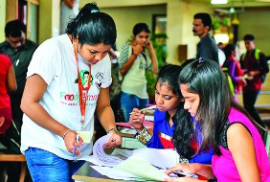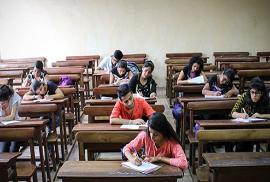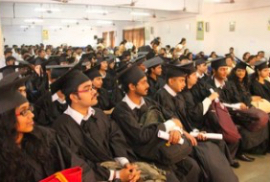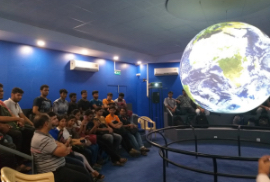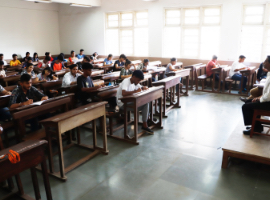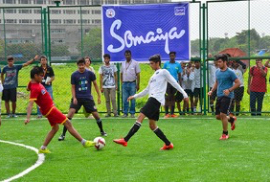Ordinance Rules
O.5042-Ordinance for Grace Marks for Passing in Each Head of Passing ( Theory / Practical / Oral / Sessional / External / Internal )
- The examinee shall be given the benefit of grace marks only for passing in each course/head of passing(Theory/Practical/Oral/Test) in End Semester Examination as follows::
| Head of Passing | Grace Marks Upto |
|---|---|
| Upto - 50 | 2 |
| 051 - 100 | 3 |
| 101 - 150 | 4 |
| 151 - 200 | 5 |
| 201 - 250 | 6 |
| 251 - 300 | 7 |
| 301 - 350 | 8 |
| 351 - 400 | 9 |
| And 401 and above | 10 |
- These grace marks may be awarded by Resolution by the evaluators subject to passing of the course. These Grace marks by resolution are applicable to all courses (only ESE) based on the Examiner’s written consent to grant the grace marks, if needed for passing.
- Provided that the benefit of such gracing marks given in different Courses/heads of passing shall not exceed 1% of the aggregate marks in that examination.
- Provided further that the benefit of gracing of marks under this Ordinance shall be applicable only if the candidate passes the entire examination of semester/year.
- Provided further that this gracing is concurrent with the rules and guidelines of professional statutory bodies at the All India level such as AICTE, MCI, Bar Council, CCIM, CCIH, NCTE UGC etc.
- Result on gazette will be indicated with @ sign, if candidate passes the semester with grace marks under this ordinance (O.5042).
Grace Marks for getting Higher Class / Grade
- Provided that the benefit of such gracing marks given in different Courses/heads of passing shall not exceed 1% of the aggregate marks in that examination.
- Provided that benefits of above mentioned grace marks shall not be given, if the candidate fails to secure necessary passing marks in the aggregate course/head of passing also, if prescribed, in the examination concerned.
- Provided further that benefits of above mentioned grace marks shall be given to the candidate for such examination/s only for which provision of award of class/Grade has been prescribed. Provided further that the gracing is concurrent with the rules and guidelines of professional statutory bodies at the All India level such as AICTE, MCI, Bar Council, CCIM, CCIH, NCTE etc.
Grace Marks for getting distinction / Grade “O” in the subject / course only.
- A Candidate/learners who passes in all the Courses or Subjects/Heads of passing in the examination without benefit of either gracing or condonation rules and whose total number of marks in the courses/subject/s falls short by not more than three marks for getting Grade “O”/distinction in the Courses/subject/s respected shall be given necessary grace marks up to three (03) in maximum two (02) subjects, courses subject to maximum 1% of the total marks of that Head of Passing whichever is more, in a given examination.
- Provided that benefit of the above mentioned grace marks shall not be given to the candidate only for such examination/s for which provision for distinction in a course/ subject has been prescribed. Provided further that this gracing is concurrent with the rules and guidelines of professional statutory bodies at the All India level such as AICTE, MCI, Bar Council, CCIM, CCIH, NCTE etc.
O.5048A - Amendments of Result
Due to errors
- In any case where it is found that the result of an examination has been affected by errors, the controller of Examination shall have power to amend such result in such manner as shall be in accordance with the true position and to make such declaration as is necessary. With the necessary approval of Vice-Chancellor / Pro Vice-Chancellor, Provided the errors are reported/detected within 6 months from the date of declaration of results. Errors detected thereafter shall be placed before the Board of Examinations
Error Means:-
- Error in computer/data entry, Printing or programming and the like.
- Clerical error, manual or machine, in totaling or entering of marks on ledger /register.
- Error due to negligence or oversight of examiner or any other person conned with evaluation, moderation and result preparation.
Due to fraud, malpractices etc.
In any case where the result of an examination has been ascertained and published and it is found that such result has been affected by any malpractices, fraud or any other improper conduct whereby an examiner has benefited and that such examiner, has in the opinion of the Board of Examination been Party of privy to or connived at such malpractice, fraud or improper conduct, the Board of Examination shall have power at any time notwithstanding the issue of the certificate or the award of a Prize or Scholarship, to amend the result of such examiner and to make such declaration as the Board of Examination considers necessary in that behalf.
O.5045A - Ordinance for Condonation
- If a candidate/learners fails in only one course/head of passing, having passed in all other courses/ heads of passing, his/her deficiency of marks in such head of passing may be condoned by not more than 1% of the aggregate marks of the examination or 10% of the total number of marks of that course/head of passing in which he/she is failing, whichever is less. However condonation, whether in one head of passing or aggregate head of passing are restricted to maximum up to 10 marks only.Condonation of deficiency of marks is shown in the Result gazette with indication of asterisk (*under ordinance O.5045).
- Condonation of deficiency of marks is shown in the Grade Card/Statement of Marks in the form of asterisk and Ordinance number.
- Provided that this condonation of marks is concurrent with the rules and guidelines of professional statutory bodies at the All India level such as AICTE, MCI, Bar Council, CCIM, CCIH, NCTE etc.
O.6246 - Ordinance for Eligibility of Term Grant
Internal Assessment, End semester examination, Practical and / or oral will be considered as separate Head of passing prescribed in the scheme of instructions and examinations. Term Work is not a separate head of passing; however a learner is eligible to appear for any form of examination only after satisfactory completion of Term Work in all courses of a particular semester as per scheme of instructions and examinations
O.6253 - Ordinance for Min. Passing Percentage
- To pass in the individual courses of semester I to VIII examinations of first to final year of engineering, a learner must obtain a minimum of 40 % of the full marks. The minimum of 40 % of the full marks must be obtained in the Internal Assessment, End semester examination, practical and oral examination separately in each course as applicable.
- A learner also pass in individual courses even if s/he fails in Internal Assessment but secure more than 50% in total (Internal Assessment + End Semester Examination) in that course
O.6086 - Attendance for learners
- There shall be the Attendance Committee, for smooth conduct of this ordinance, in every college/institute/Department of the University comprising of at least three members (to be nominated from other departments in case of the University Departments having less than 3 teachers), the Vice-Principal/ Senior Teacher (Convener) and at least two more teachers ensuring representation of the concerned faculties, nominated by the Principal/Director/Head.
- Every bonafide learner shall ordinarily be allowed to keep terms for the given semester in a program of his enrolment, only if he fulfills at least seventy five percent (75%) of the attendance taken as an average of the total number of lectures, practical’s, tutorials etc. wherein short and/or long excursions/field visits/study tours organized by the college and supervised by the teachers as envisaged in the syllabus shall be credited to his attendance for the total no of periods which are otherwise delivered on the material day/s. Further it is mandatory for every learner to have min 50% attendance for each course & average attendance has to be 75%.
- The same ratio shall be applied for computing the attendance of the learners by crediting the number of periods which are missed while participating in an extracurricular/co-curricular activity/competition/camp/ workshop/convention/symposium/seminar etc. where the said learner is officially representing the college/ University/ District/ State/ Country with the permission of the Principal /Director/ Head of the College/ Institute/ University Department or by the direction of the University Officer as the case may be wherein for the purpose of computing the average attendance the periods missed for what is envisaged here-inabove, at Sr. No 2, shall be deemed to have been attended by the said learner .
- Without prejudice to what is stated here-in-above, the Principal/Director/Head of the concerned College/Institute/Department of the University shall be the competent authority to condone the absentee of any learner further up to additional 25%, if deemed fit and on recommendation of the attendance committee of the said college/Institute/Department of the University, wherein it is mandatory on the said committee to do natural justice by giving personal hearing to every learner falling short of minimum attendance for keeping terms and recommending case by case to the competent authority having verified the genuineness and gravity of the problem that justifies the learner to remain absent, which generally shall be limited to his own sickness, sickness of his parent, death of his parent etc. supported by valid evidence, documentary or otherwise.
- The attendance committee ensures that the attendance records are maintained in order and that the warning letters are issued to the defaulting learners at least twice in every semester & that in the first week of every month for the previous month default list it display on college notice board. If they are falling short of attendance while also displaying the list of defaulters declaring their respective attendance for the month. The defaulting learners should also be called (along with the parent/guardian wherever necessary) to meet the Convener, attendance committee in the middle of the semester with a view to make the consequences adequately clear while understanding the difficulties if any and encouraging the learner to comply with the requirement of the attendance. Needless to say that the learners should be made aware of the provisions of the ordinances for attendance at the time of admission and an undertaking may be obtained from them (countersigned by the parent/guardian wherever necessary) assuring regular attendance while understanding the consequences of defaulting.
- At the end of the semester on recommendation of the attendance committee the Principal/Director/Head of the college/Institute/University Department shall display list of the learners who are not allowed to keep terms, allowing them to appeal to the Principal/Director/Head of the College/Institute/Department of the University within 3 days from the date of display of the notice. After disposing the appeals the Principal/Director/Head shall intimate the same to the In-charge of Examinations/the Controller of examinations to withdraw the examination forms of such defaulting learner sunder intimation to those learners ensuring that this communication reaches the concerned at least 10 clear days before the commencement of the respective examinations.
- The learners whose terms are not granted by the college/institute/department of the University can appeal to the controller of examinations, if desired, in a prescribed form and by paying fees prescribed by the Management Council within 3 days from the receipt of this intimation and that the controller of examinations shall arrange a hearing of the learners along with their concerned Principals/Directors/Heads of the Department, represented in person or through a teacher nominated by them before the committee (one each for every faculty) nominated by the Management Council comprising of 3 members including the convener. The respective committees shall convey their decisions to the controller of examinations which shall be final and binding on the learners once accepted and communicated by the controller of examinations.
O.5050A - Ordinance for candidates resorting to Malpractices during Examinations
1. Definition-Unless the context otherwise requires:
b) “Student” means and includes a person who is enrolled as such by the College/Institution for receiving instruction qualifying for any degree or certificate awarded by the College on behalf of University of Mumbai. It includes ex-students and students registered as candidates (examinee) for any of the degree, diploma, or certificate examination.
c) “Unfair means” includes one or more of the following acts or omissions on the part of student/s during the examination period.
i. Possessing unfair means material (including books, written chits, electronic gadgets such as mobile phone, smart watch etc.) and or copying from there.
ii. Transcribing any unauthorized material or any other use thereof.
iii. Intimidating or using obscene language or threatening or use of violence against invigilator or person on duty for the conduct of examination or manhandling him/her or leaving the examination hall without permission of the supervisor or causing disturbance in any manner in the examination proceedings.
iv. Unauthorized communicating with other examiners or anyone else inside or outside the examination hall.
v. Mutual / Mass copying.
vi. Smuggling-out, either blank or written, or smuggling-in of answer books as copying material.
vii. Smuggling-in blank or written answer book and forging signature of the Jr. Supervisor thereon.
viii. Interfering with or counterfeiting of College/ Institution seal, or answer-books or office stationary used in the examinations.
ix. Insertion of currency notes in the answer-books or attempting to bribe any of the persons connected with conduct of examinations.
x. Impersonation at the College/Institution examination.
xi. Revealing identity in any form in the answer written or in any other part if the answer-book by the student at the College or Institution examination.
xii. Or any other similar acts/and/or omission/s which may be considered as unfair means by the competent authority.
d) “Unfair means relating to examination” means and includes directly or indirectly committing or attempting to commit or threatening to commit any act or coercion, undue influence or fraud or malpractice with a view to obtaining wrongful gain to him or to any other person or causing wrongful loss to other person/s.
e) “Unfair means material” means and includes any material whatsoever, related to the subject of the examination, printed, typed, handwritten or otherwise on the person or on clothes, or body
of the student (examinee) or on wood or other material, in any manner or in the form of chart, diagram, map or drawing or electronic aid etc. which is not allowed in the examination hall.
f) “Possession of unfair means material by a student” means having any unauthorized material on his/her person or desk or chair or table or at any place within his/her reach, in the examination centre and its environs or premises at any time from the commencement of the examination till its conclusion.
g) “Student found in possession” means a student, reported in writing, as having been found in possession of unfair means material by Jr. Supervisor, Sr. Supervisor, member of the Vigilance Squad or Examination & Evaluation Committee or any other person authorized for this purpose, in this behalf, even in the unfair means material is not produced as evidence because of it being reported as swallowed or destroyed or snatched away or otherwise taken away or spoiled by the student or by any other person acting on his behalf to such an extent that it has become illegible. A report provided to that effect is submitted by the Sr. Supervisor or Chief Conductor or any other authorized person to the Controller of Examinations or Principal or Head of the Institution concerned or any officer authorized on this behalf.
h) “Material related to the subject of examination” means and includes, if the material is produced as evidence, any material certified as related to the subject of the examination by a competent person and if the material is not produced as evidence or has become illegible for any of the reasons referred to in clause (f) above, the presumption shall be that the material did relate to the subject of the examination.
2. Procedure to be followed during Examination
During examination, examinees and other students shall be under disciplinary control of the Chief Conductor/s. Chief Conductor/s of the Examination Centre shall, in the case of unfair means, follow the procedure as under:
(a) The student shall be called upon to surrender to the Chief Conductor the unfair means material found in his or her possession, if any, and his/her answer-book.
(b) Signature of the concerned student shall be obtained on the relevant materials and list thereon. Concerned Sr. Supervisor and the Chief Conductor shall also sign on all the relevant materials and documents.
(c) Statement of the student and his/her undertaking in the prescribed format and statement of the concerned Jr. Supervisor and Sr. Supervisor shall be recorded in writing by the Chief Conductor (Appendix-1 & 2). If the student refuses to make a statement or to give undertaking to the concerned Jr. / Sr. Supervisor or Chief Conductor shall record accordingly under their signatures.
(d) Chief Conductor shall take one or more of the following decisions depending upon seriousness/gravity of the case:
1. In the case of impersonation or violence, expel the concerned student from the examination and not allow him/her to appear for the remaining examination.
2. Obtain undertaking from the student to the effect that the decision of the concerned competent authority in his/her case shall be final and binding and allow him/her to continue with his/her examination.
3. May report the case to the concerned police station as per the provisions of Maharashtra Act No. XXXI1982- An Act provided for preventing malpractices at University/College; Board and other specified examinations.
4. Confiscate his/her answer-book, mark it as “suspected unfair means case” and issue him/her fresh answer-book duly marked.
(e) All the materials and list of material mentioned in sub-clause (9.1.1 b) and the undertaking with the statement of the student and that of the Jr. Supervisor and mentioned as in clause No. (9.1.2 c) and the answer-book shall be forwarded by the Chief Conductor, along with his report, to the concerned Controller of Examinations/ Principal/Head of the Institution, as the case may be, in a separate and confidential sealed envelope marked “Suspected unfair means case”.
(f) In case of unfair means of oral type, the Jr. Supervisor and the Sr. Supervisor or concerned authorized person shall record the facts in writing and shall report the same to the concerned Controller of Examinations/Principal/Head of the Institution, as the case may be.
(g) On receipt of a report regarding use of unfair means by any students at any college examination, including breach of any of the rules laid down by the Examination and Evaluation Committee Authorities for proper conduct of examination, which shall have power at any time to institute inquiry and to punish such unfair means or breach of the rules by exclusion of such student from any college examination or from any college course for the purpose of conferring degree either permanently or for a specified period, or by cancellation of the result of the student in the college examination for which the student appeared or by deprivation of College/ Institution Scholarship, any college prize or medal to him/her or by imposition of fine or in any two or more of the aforesaid ways within a period of one year.
3. Punishment
The competent Authority concerned i.e. the concerned Principal in the cases of college examination, after taking into consideration the report of the Committee shall pass such orders as it deems fit including granting the student benefit of doubt, issuing warning or exonerating him/her from the charges and shall impose any one or more of the following punishments on the students found guilty of using unfair means:
a) Annulment of performance of the student in full or in part in the examination he/she has appeared for.
b) Debarring the student from appearing for any examination of College for a stipulated period not exceeding five years.
c) Debarring the student from taking admission for any course in the College or Institution for a stipulated period not exceeding five years.
d) Cancellation of the College Scholarship/s or award/s or prize or medal etc. awarded to him /her in that examination.
e) In addition to the above mentioned punishment, the competent authority may impose a fine on the student declared guilty. If the student concerned fails to pay the fine within a stipulated period, the competent authority may impose on such a student additional punishment / penalty as it may deem fit.
f) As far as possible the quantum of punishment should be as prescribed (category wise) in Appendix –A.
g) The concerned student is informed of the punishment finally imposed on him/her in writing by the competent authority or by the Officer authorized by it on this behalf, under intimation to the College.
Appendix A
Sr. No. Nature of Unfair Means adopted Quantum of punishment
1. Possession of any copying Material *Annulment of the performance of the student at the College Examination in full. (This quantum will also apply to the following categories of adoption of unfair means at Sr. No. 2 to 14 in addition to the one prescribed thereat).
2. Possession of any copying material & actual copying from the material in possession Exclusion of the student from the College Examinations concerned for one subsequent examination.
3. Possession of another student’s answer book or supplementary sheet. Exclusion of both the students from the College Examinations concerned for one subsequent examination * (BOTH THE LEARNERS).
4. Possession of another student’s answer book or supplementary sheet and actual evidence copying from that. Exclusion of both the students from the College Examination concerned for two subsequent examinations * (BOTH THE LEARNERS).
5. Mutual/ Mass copying. Exclusion of all the students from the College Examinations concerned for two subsequent examinations *.
6. Smuggling of answer books in or out as copying material. Exclusion of the students from the College Examinations concerned for two subsequent examinations *.
7. Smuggling in a written answer book based on the question paper set at the examination. Exclusion of the student from the College Examinations concerned for three subsequent examinations *.
8. Smuggling in a written answer book as copying material and forging the signature of the Junior Supervisor on the same. Exclusion of the student from the College Examinations concerned for four subsequent examinations *.
9. Attempt to forge the signature of the Junior Supervisor on the answer book or the supplementary sheet. Exclusion of the student from the College Examinations concerned for four subsequent examinations *.
10. Interfering with or counterfeiting of college seal or answer books or office stationery used in the examination with the intention of misleading the authorities. Exclusion of the student from the College Examinations concerned for four subsequent examinations *.
11. Answer book or supplementary sheet outside the examination hall or any other insertion in the answer book. Exclusion of the student from the College Examinations concerned for four subsequent examinations *.
12. Insertion of currency notes/ bribing or attempt to bribe any of the persons connected with the conduct of the examination. Exclusion of the student from the College Examinations concerned for four subsequent examinations *
(Note: This money shall be credited to the students Welfare Fund).
13. Using obscene language/ violent threats inside the examination hall by a student at the College examination to room supervisor/ any other authority. Exclusion of the student from the College Examinations concerned for four subsequent examinations *.
14. Impersonation for a student or impersonation by a learner in College or other examinations. Exclusion of the student from the College Examinations concerned for five subsequent examinations *
(both the student if the impersonator is a college learner).
15. Revealing the identity of the candidate in any form (name, roll number, learner number, religious invocation etc.) in the main answer book and/ or supplementary sheet, by the learner at the college examination. Annulment of the performance of the student at the College Examination in full.
16. Anything found written on the body or on the clothes while in the examination. Annulment of the performance of the student at the College Examination in full.
17. Making an appeal to the examiner/ any person connected with the conduct of examination by using any mode of communication. Annulment of the performance of the student at the College Examination in full.
18. Any other malpractices not covered in the aforesaid categories. Annulment of the performance of the learner at the College Examination in full and severe punishment depending upon the gravity of the offence.
Note:
The term “Annulment of Performance in full" includes performance of the student at the theory examination, but does not include performance at term work, project work with its term work, oral or practical and dissertation examinations unless malpractice used thereat.
If on previous occasions, disciplinary action was taken against a student for malpractice during examination, and he/she is caught again for malpractices used at the examinations, in this event, he/she shall be dealt with severely. Enhanced punishment can be imposed on such learners. This enhanced punishment may extend to double the punishment provided for the offence that was committed at the second or subsequent examination.
Practical/Dissertation/Project Examination:
A student involved in malpractices at Practical/ Dissertation/ Project examinations shall be dealt with as per the punishment provided for the theory examination.
O.229 - Ordinance for Sports Grace Marks
- 1. For the CBGS system, instead of giving 10 grace marks in the total, an additional 0.1 point shall be added to SGPI, if the candidate has been cleared in all heads of passing.
- 2. In case of failure in one or more Heads of passing in an Examination, the benefit of grace marks shall be granted to the extent of 5% of the maximum marks allotted to the Head of passing of the concerned subject.
- 3. Based on similar rules of University of Mumbai, this Ordinance in detail is as follows: Ordinance for Sports Grace: Candidates appearing for any of the University Examination/Examinations conducted by colleges on behalf of the University shall be eligible for the award of up to maximum 10 grace marks, at their option, wherever necessary in addition to the marks secured in each Head of passing for participation in any one of the activities mentioned below:.
- a) Candidates who are members of the team/s reaching Quarter final at intercollegiate sports competitions or have secured one of the eight places in order of merit in an .
- OR
- b) Candidates who are members of team/s securing first three positions in cultural group events or have secured one of the first three places in an individual cultural event or whose performance has been adjudged best as an Actor/Actress, Music Director, Lighting/Sound effect operator, Author, Choreographer, or as Director in Group events conducted at the Intercollegiate cultural competition organized by the University, or have represented the University in any of the cultural events either at the State level or at the Zonal level or at the National level or at the International level in the same academic year as certified by the Head of the concerned Section of Mumbai University..
- OR
- c) Candidates who are members of Candidates’ councils constituted under Section 40 (2) (a) or Section 40 (2) (b) or under Section 40 (4) of the Maharashtra Universities Act 1994, and have actively participated in various schemes, programs and attended functions of the University during that academic year, as certified by the Director of Candidates Welfare of Mumbai University..
- The benefit of 10 grace marks (In CBCGS, the increase in SGPI by 0.1) would be available to the candidates, only in any one of the activities mentioned above, at their option, subject to their fulfilling the following conditions:.
- 1. That they are appearing for any End Semester Examination, as their first attempt..
- 2.That in case of failure in one or more Heads of passing an Examination, the benefit of grace marks shall be granted to the extent of 5% of the maximum marks allotted to the Head of passing the concerned subject..
- 3.That maximum 10 grace marks will be added to the grand total, however, in the case of credit based grading system (CBGS) the marks (0.1) will be added in the final grade to the GPA (SGPI), even if the benefit is given to candidates for passing the subject/s..
- 4.That if the examination is conducted in semesters and the marks of the two semesters are clubbed, the same shall be granted in even semester examination of that academic year (In CBCGS system, instead of 10 Grace marks in total, the SGPI shall be increased by 0.1)..
- 5.Grace marks awarded under the ordinances should be shown separately, as was done till now, with the sign # and should not be merged with the marks secured in the heads of passing..
- 6.Combined benefit of Sports Grace marks and Semester Grace marks (similar to 0.5045 of M.U.) can be given only if the candidate has passed in all heads except TWO before applying the Sports Grace marks..
- 7.That the grace marks under this Ordinance will not be counted for the award of scholarships, prizes and medals or any other awards..
- 8.That the rules regarding grace marks under this Ordinance shall be applied first and the same shall separately be shown in the marks sheet of the candidates..






